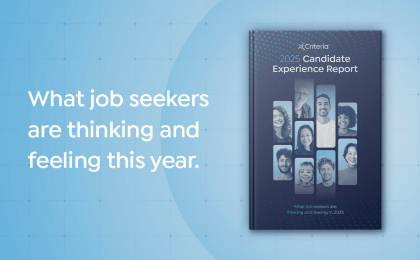Last month, Criteria had the pleasure of exhibiting at the 2023 HR Technology Conference & Exhibition held in Las Vegas. Gathering the largest showcase of HR technologies in the world, HR Tech provided over 10,000 attendees with a glimpse of the technology that’s changing the face of HR and workplaces today. This expo offered the opportunity to connect with some world-leading Industry Partners and HR Tech's biggest voices.

We were truly impressed by the incredible collection of thought leadership in attendance and the energy that filled the air. We were thrilled to be exhibiting amongst more than 400 other leading HR and tech providers, showcasing our best in class science-based assessment and video interviewing tools that offer the strongest talent signal available on the market today. What truly made this conference special was the opportunity to personally connect with each and everyone who stopped by our booth to say hello and learn about Criteria. We hope you had a chance to spin our prize wheel and take home some fun swag!

During the event, we gained invaluable insights from industry professionals, thought leaders, and technology enthusiasts. We were captivated by industry leaders like Jason Averbook of Mercer & LeapGen, Ally Bailey from Smart Recruiters, Dr. Jarij Conrad of UKG, Andrew Curtis from iCIMS, and Donald Knight of Greenhouse, immersing ourselves in the wealth of knowledge they provided. Whether or not you were able to attend, we hope you find these key learnings both thought-provoking and influential in shaping your future hiring and retention strategies.
With that in mind, here are our key takeaways from the HR Tech Conference:
1. The war for talent is over. Talent won.
There was a prevailing theme centered around the shifting dynamics of the job market, especially in the aftermath of the Great Resignation. In the current competitive landscape, top talent now holds the upper hand and organizations must actively compete for their skills and expertise. This recognition prompts a focus on realigning selection processes on competency-based hiring over antiquated resumes. Organizations also can't underestimate the importance of creating a workplace culture that not only attracts but nurtures talent.
To effectively compete for top talent, organizations need to have a compelling talent strategy. This involves implementing initiatives that go beyond traditional recruitment efforts and encompass measures to secure and retain high-performing individuals. Strategies might include offering competitive compensation packages, providing opportunities for career growth, fostering a positive work environment, promoting work-life balance, and implementing employee recognition programs. Read our 2023 Candidate Experience Report for a more in depth look into the desires and motivators of job candidates today.
The focus throughout the conference was on the need for organizations to actively adapt and evolve their talent strategies to meet the demands of the changing job market to ensure they remain competitive in attracting and retaining the best talent. By creating a workplace culture that values and invests in its employees, organizations can attract and retain top talent, leading to increased productivity, innovation, and overall success.
And there's one particular lever organizations can pull to increase their chances of attracting talent: a positive candidate experience.
2. Candidate experience is of paramount importance.
The job market is increasingly candidate-driven, and organizations are realizing the need to prioritize and enhance the experience of job seekers throughout the hiring process. This shift in focus is driven by the understanding that a positive candidate experience not only makes top talent more likely to accept an offer, but that it also positively impacts an organization's employer brand and reputation.
Sessions and discussions at HR Tech highlighted the significance of creating a seamless and engaging candidate experience. It seems like employers are finally recognizing the crucial role that technology plays in optimizing the hiring process and improving the overall candidate experience. From streamlining the application process to leveraging assessments and structured interviews, organizations are embracing technology to make the candidate experience more efficient, transparent, and personalized.
The emphasis on candidate experience highlights the understanding that job seekers are not just passive applicants but active consumers of the hiring process. Organizations that prioritize and enhance the candidate experience are more likely to attract and retain top talent, improve their employer brand, and ultimately achieve better hiring outcomes. As a result, organizations are increasingly leveraging technology and adopting best practices to create a positive and memorable candidate experience throughout their entire hiring journey.
See more: How to build a positive candidate experience at every stage of the hiring process
3. The buzz around AI isn’t slowing down.
The potential of AI - including generative AI - in transforming various aspects of HR was a prominent and widely-discussed topic throughout the expo hall and during speaker sessions. During these sessions, AI was acknowledged as a powerful and transformative tool, especially when applied responsibly and ethically. These conversations highlighted how AI has the capacity to significantly improve efficiency and effectiveness across multiple HR functions, including talent acquisition, candidate assessments, employee onboarding, and compliance. The discussions also underscored the numerous benefits of AI, from process optimization to bias reduction and improved decision-making , showcasing the profound impact of AI in the ever-evolving HR field.
However, people acknowledged that the implementation of AI in hiring and HR requires careful consideration and oversight. Concerns about the potential risks associated with bias and lack of transparency in AI-driven hiring processes were hot topics of discussion. These conversations emphasized the importance of using AI in a responsible and transparent manner. The best practices for AI deployment in HR ensure that it is used in alignment with ethical standards and legal requirements (see our recent blog on what the New York AEDT Rule means for AI and bias regulation).
Overall, the conversations around AI and generative AI reflected a growing recognition of the potential for shaping the future of work. While acknowledging the need for caution and responsible implementation, HR professionals expressed a keen interest in leveraging AI to improve their talent management practices.
See more: AI in Hiring: Getting the best from humans and artificial intelligence
4. Skills-based hiring is still on top.
Fueled by the realization that resumes and educational backgrounds fall short in capturing a candidate's true potential, the hiring process is shifting its focus towards specific skills and competencies. This shift towards a skills-based hiring approach involves looking beyond traditional qualifications and delving deeper into the capabilities that directly contribute to job success. By clearly defining the essential skills and competencies needed for a role and assessing candidates based on those criteria, organizations can make more informed and objective hiring decisions. This approach not only widens the candidate pool but also increases the likelihood of finding candidates who possess the necessary skills to excel in the position.
The preference for skills-based hiring aligns with the evolving job market, where rapid technological advancements and changing job roles require adaptable individuals with transferable skills. By focusing on skills, organizations can identify candidates who have the potential to learn and grow within their organization, ensuring a better fit and long-term success.
Skills-based hiring also promotes diversity and inclusion by providing opportunities for individuals from non-traditional backgrounds who may possess the required skills but lack traditional qualifications.
See more: How to conduct skills-based hiring
---
A summary of our key takeaways:
-
Organizations need to actively adapt and evolve their talent strategies to ensure they remain competitive in a candidate-driven market.
-
The candidate experience can be improved by leveraging technology solutions that offer efficiency, transparency, and personalization.
-
While HR professionals continue to leverage AI to improve their talent management practices, careful consideration is still required to avoid bias and discrimination.
-
Skills-based hiring continues to reign supreme as the more reliable and effective hiring practice, and we don’t anticipate that changing anytime soon.
That’s a wrap — we look forward to seeing you at our next event!





